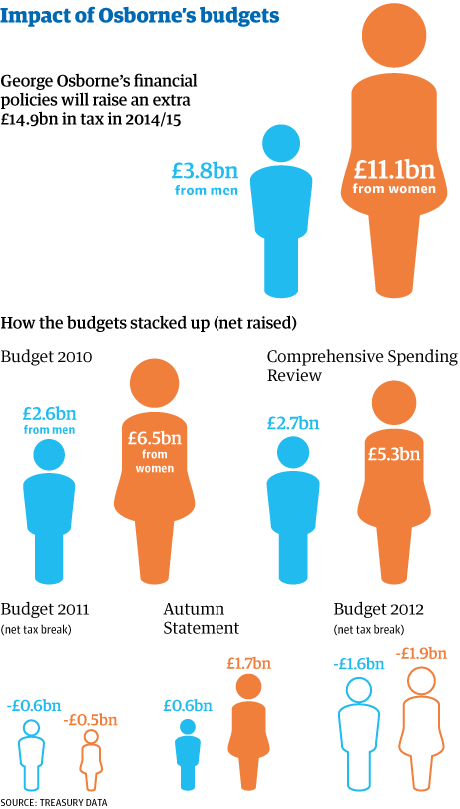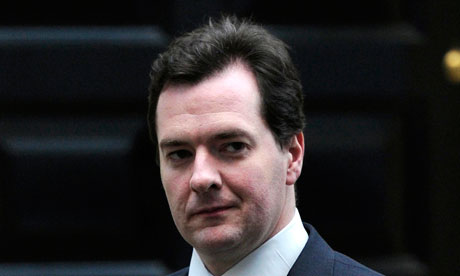George Osborne's
financial policies are hitting women three times as hard as men,
according to research on the impact of his budgets seen by the Guardian.
An analysis of Treasury data by House of Commons Library researchers shows £11.1bn of the £14.9bn raised from the five spending reviews since 2010 comes from women even though they earn less than men on average. Planned changes to tax credits, child benefits and public sector pensions are largely to blame.
Equality and anti-poverty campaigners have already raised concerns before changes to working tax credits, which will hit the lowest paid families, comes into force on 6 April. The tax and benefit changes come shortly after the government announced plans to cut the 50p top rate of tax for all those earning over £150,000 in its latest budget.

Source: guardian
Author: Jane Martinson
An analysis of Treasury data by House of Commons Library researchers shows £11.1bn of the £14.9bn raised from the five spending reviews since 2010 comes from women even though they earn less than men on average. Planned changes to tax credits, child benefits and public sector pensions are largely to blame.
Equality and anti-poverty campaigners have already raised concerns before changes to working tax credits, which will hit the lowest paid families, comes into force on 6 April. The tax and benefit changes come shortly after the government announced plans to cut the 50p top rate of tax for all those earning over £150,000 in its latest budget.

Impact of Osborne's budgets on women
Yvette Cooper, the shadow home secretary and minister for women and equalities, said: "David Cameron and George Osborne's claim that we are all in this together is now ringing very hollow. Last week, it was clear that millionaires will benefit, whilst millions of people are paying more.
"Since the election, [they] have had five opportunities to change track and demonstrate they understand the reality of women's lives. Each time they have failed."
A Treasury spokesman insisted the government was reducing the deficit fairly. "Decisions to increase spending on health, as well as introducing flexible parental leave and extending the right to request flexible working will all benefit women.
"At the budget we announced further increases in the personal allowance that will take 2 million people out of tax altogether, the majority of whom are women. Next week will also see the biggest ever cash increase in the basic state pension, and the majority of beneficiaries are women."
But Alison Garnham, chief executive of the Child Poverty Action Group, said: "Cut after cut has meant that women, have lost out under this government. Mums with young families have especially been feeling the pain.
"Women are the biggest users of public services, they are more likely to be affected by public sector job losses and more likely to be hit by the unprecedented cuts in welfare benefits.
"It's difficult to see how the government can meet its promise to be the most family friendly government in history if carries on being so unfriendly to women."
The latest analysis is based on policy pronouncements since 2010 up to 2014. Commons researchers used Red Book estimates and as such may underestimate how much women will bear the brunt of government policies by suggesting that the proposal to cut the 50p tax rate to 45p will only cost £100m. Paul Johnson at the IFS, the independent think tank, has warned that a slight alteration to the model used to calculate the £100m estimate would change the cost to the exchequer to £1bn. As some 85% of higher rate taxpayers are men, more of them will gain from the policy than women.
The biggest impact comes from proposed changes to public sector pensions announced in the coalition's very first budget. With women making up 65% of the local authority workforce affected by the changes, they will receive £5bn less compared with £2.6bn for men.
The analysis does not include plans to hit regional public sector pay, which again has a bigger impact on female employees.
Usdaw, whose membership includes many part-time shopworkers, and anti-poverty groups have campaigned against the proposed changes to working tax credits, some of which come into force this week. To qualify couples with child-caring responsibilities must work at least 24 hours a week, rather than 16.
Child Poverty Action Group has estimated that a couple with children, one working 20 hours on minimum wage will lose £74.34 a week, almost £4,000 a year.
Garnham said: "When the plan was announced the government said the economy would be strong again by now. But people can see in their own community that this hasn't happened. Employers simply don't have the extra hours to give and unemployment is still rising."
Her colleague, Imran Hussain, the group's head of policy, dubbed the forthcoming Christian holiday "bloody awful Friday" as a result of the changes.
The analysis shows even positive measures, such as increasing the personal tax threshold, fails to outweigh the hardships.
Equality campaigners also fear the impact on female independence of changing the presumption that benefits for children are paid to the main carer from next year. Garnham said it threatened to be a "historic redistribution of income from purse to wallet".
Anna Bird, deputy chief executive of the Fawcett Society, warned that the changes were forcing thousands of women back into the home. "Changing the working tax credit was one of the most damaging changes for women trying to work. It's hard to see much evidence that the government is listening when they have done nothing on the cumulative impact of women's equality."
The fact that support among women fell so sharply prompted David Cameron appointed a female policy adviser, Laura Trott, to advise on how his policies will affect women.
The latest budget was the first to show women gaining marginally more than men, largely by giving back an estimated £627m on child benefit. The overall loss to removing the previously universal benefit is £1.6bn however.
In the latest Yougov poll, women were less 25% approval rating compared with 32% men.
In the latest budget, the chancellor also suggested that another £10bn could be cut from welfare budgets, following cuts totalling £18bn from 2011-4.
Bird said: "From our point of view no government is really listening if it mentions another £10bn in welfare cuts." Fawcett estimates that one fifth of an average women's income is derived from benefit, compared with one tenth of men.
By contrast, more than four out of 10 men believe they would benefit under Mr Osborne's plans.
Original Article
Yvette Cooper, the shadow home secretary and minister for women and equalities, said: "David Cameron and George Osborne's claim that we are all in this together is now ringing very hollow. Last week, it was clear that millionaires will benefit, whilst millions of people are paying more.
"Since the election, [they] have had five opportunities to change track and demonstrate they understand the reality of women's lives. Each time they have failed."
A Treasury spokesman insisted the government was reducing the deficit fairly. "Decisions to increase spending on health, as well as introducing flexible parental leave and extending the right to request flexible working will all benefit women.
"At the budget we announced further increases in the personal allowance that will take 2 million people out of tax altogether, the majority of whom are women. Next week will also see the biggest ever cash increase in the basic state pension, and the majority of beneficiaries are women."
But Alison Garnham, chief executive of the Child Poverty Action Group, said: "Cut after cut has meant that women, have lost out under this government. Mums with young families have especially been feeling the pain.
"Women are the biggest users of public services, they are more likely to be affected by public sector job losses and more likely to be hit by the unprecedented cuts in welfare benefits.
"It's difficult to see how the government can meet its promise to be the most family friendly government in history if carries on being so unfriendly to women."
The latest analysis is based on policy pronouncements since 2010 up to 2014. Commons researchers used Red Book estimates and as such may underestimate how much women will bear the brunt of government policies by suggesting that the proposal to cut the 50p tax rate to 45p will only cost £100m. Paul Johnson at the IFS, the independent think tank, has warned that a slight alteration to the model used to calculate the £100m estimate would change the cost to the exchequer to £1bn. As some 85% of higher rate taxpayers are men, more of them will gain from the policy than women.
The biggest impact comes from proposed changes to public sector pensions announced in the coalition's very first budget. With women making up 65% of the local authority workforce affected by the changes, they will receive £5bn less compared with £2.6bn for men.
The analysis does not include plans to hit regional public sector pay, which again has a bigger impact on female employees.
Usdaw, whose membership includes many part-time shopworkers, and anti-poverty groups have campaigned against the proposed changes to working tax credits, some of which come into force this week. To qualify couples with child-caring responsibilities must work at least 24 hours a week, rather than 16.
Child Poverty Action Group has estimated that a couple with children, one working 20 hours on minimum wage will lose £74.34 a week, almost £4,000 a year.
Garnham said: "When the plan was announced the government said the economy would be strong again by now. But people can see in their own community that this hasn't happened. Employers simply don't have the extra hours to give and unemployment is still rising."
Her colleague, Imran Hussain, the group's head of policy, dubbed the forthcoming Christian holiday "bloody awful Friday" as a result of the changes.
The analysis shows even positive measures, such as increasing the personal tax threshold, fails to outweigh the hardships.
Equality campaigners also fear the impact on female independence of changing the presumption that benefits for children are paid to the main carer from next year. Garnham said it threatened to be a "historic redistribution of income from purse to wallet".
Anna Bird, deputy chief executive of the Fawcett Society, warned that the changes were forcing thousands of women back into the home. "Changing the working tax credit was one of the most damaging changes for women trying to work. It's hard to see much evidence that the government is listening when they have done nothing on the cumulative impact of women's equality."
The fact that support among women fell so sharply prompted David Cameron appointed a female policy adviser, Laura Trott, to advise on how his policies will affect women.
The latest budget was the first to show women gaining marginally more than men, largely by giving back an estimated £627m on child benefit. The overall loss to removing the previously universal benefit is £1.6bn however.
In the latest Yougov poll, women were less 25% approval rating compared with 32% men.
In the latest budget, the chancellor also suggested that another £10bn could be cut from welfare budgets, following cuts totalling £18bn from 2011-4.
Bird said: "From our point of view no government is really listening if it mentions another £10bn in welfare cuts." Fawcett estimates that one fifth of an average women's income is derived from benefit, compared with one tenth of men.
By contrast, more than four out of 10 men believe they would benefit under Mr Osborne's plans.
Source: guardian
Author: Jane Martinson

No comments:
Post a Comment